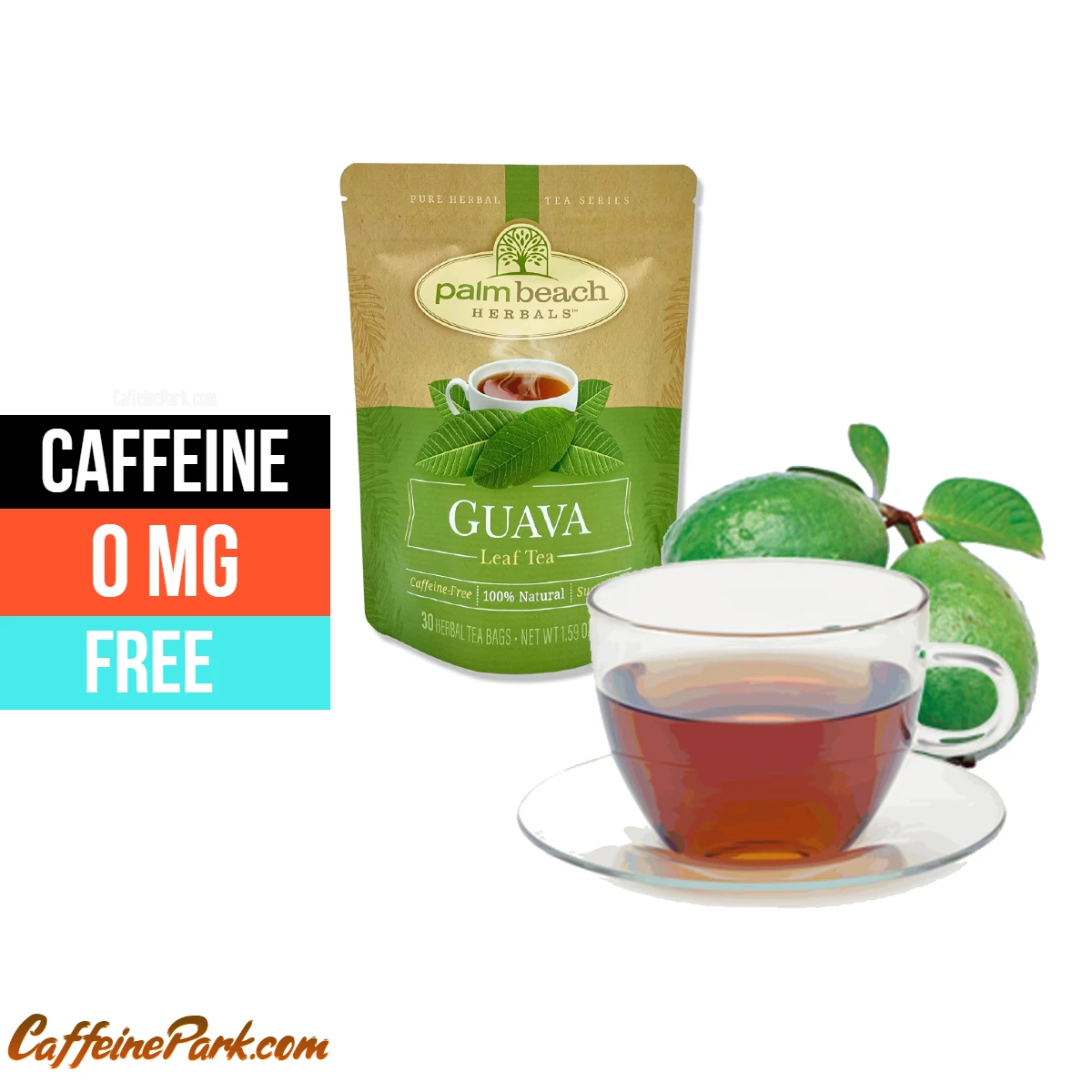Guava Tea Caffeine Content

Guava tea is a beverage made by steeping the leaves or bark of the guava tree in hot water. The tea is said to have a variety of health benefits, including aiding in digestion and reducing inflammation. Some people also make guava leaf tea to help with weight loss. The tea has a sweet taste and can be consumed hot or cold. It is a popular drink in many countries, especially in tropical regions where guava trees are commonly found.
Caffeine content in guava tea is generally low to none as guava leaves are not known to contain caffeine. This makes it a great alternative to traditional tea and coffee for those who are sensitive to caffeine or looking to reduce their caffeine intake.
Guava leaves contain a range of active ingredients that may be beneficial for health. These include antioxidants, such as vitamin C, flavonoids, and carotenoids, which can help to protect the body against damage from free radicals. Guava leaves are also rich in compounds called tannins and flavonoids, which have anti-inflammatory and antimicrobial properties. Additionally, guava leaves contain compounds called guava leaf polyphenols, which have been found to have anti-diabetic and anti-obesity effects.
However, guava leaves tea or infusion should not be consumed in large quantity, as it can cause some side effects such as abdominal discomfort, diarrhea, and skin rash. And it is always advisable to consult a doctor before consuming any herbal teas, especially if you are pregnant, breastfeeding, or taking any medications.
Guava tea is a delicious and healthy beverage that can be enjoyed by people of all ages. Its low caffeine content and the presence of active ingredients make it a great choice for anyone looking to improve their health and well-being.
Does Guava Tea have caffeine?
No, Guava tea is generally caffeine-free as the guava leaves are not known to contain caffeine. This makes it a great alternative to traditional tea and coffee for those who are sensitive to caffeine or looking to reduce their caffeine intake. However, it’s always best to check with the manufacturer or the packaging if it’s blended or mixed with other ingredients that may contain caffeine.
| Serving size | Caffeine Amount | Caffeine strength |
|---|---|---|
| 8 fl oz cup | 0 mg | CAFFEINE-FREE |
How Much Caffeine is in Guava Tea?
- Caffeine Amount: 0mg
- Caffeine strength: Caffeine-Free
- Calories: 0
- Serving size: 8 fl oz
Comparison of Caffeine in Guava Tea Vs. Other tea
Guava tea is generally caffeine-free as the guava leaves are not known to contain caffeine. This makes it a great alternative to traditional tea and coffee for those who are sensitive to caffeine or looking to reduce their caffeine intake.
When comparing guava tea to other types of tea, it is important to note that the caffeine content can vary depending on the type of tea and how it is prepared. For example, black tea, such as Earl Grey or English Breakfast, tends to have higher levels of caffeine than green tea or white tea. Herbal teas, such as chamomile or peppermint, are generally caffeine-free.
Here is a comparison of caffeine content in some of the popular teas:
- Black tea: Contains about 40-60 mg of caffeine per 8 oz cup
- Green tea: Contains about 25-40 mg of caffeine per 8 oz cup
- White tea: Contains about 15-20 mg of caffeine per 8 oz cup
- Herbal tea: Contains 0-8 mg of caffeine per 8 oz cup
It is always best to check with the manufacturer or packaging for the exact caffeine content of the tea, as it can vary depending on factors such as the type of tea, growing conditions, and brewing methods.
| Hot Drinks | serving size | Caffeine |
|---|---|---|
| Guava Tea | 8 fl oz | 0mg |
| Starbucks passion tea | 8 fl oz | 0mg |
| Black tea | 8 fl oz | 60mg |
| Matcha tea | 8 fl oz | 60mg |
| Green tea | 8 fl oz | 30mg |
| Yellow Tea | 8 fl oz | 63mg |
| Lipton Tea | 8 fl oz | 55mg |
Guava Leaves Tea Caffeine-Free Tea (1 Box of 20 Tea Bags)

- Brand: ABC Tea House
- Item Form: Tea Bags
- Flavor: Guava
- Unit Count: 20.00 Count
- Diet Type: Gluten Free
Review
Guava tea is a beverage made by steeping the leaves or bark of the guava tree in hot water. The tea is said to have a variety of health benefits, including aiding digestion and reducing inflammation. Some people also make guava leaf tea to help with weight loss. The tea has a sweet taste and can be consumed hot or cold. It is a popular drink in many countries, especially in tropical regions where guava trees are commonly found.
History
Guava tea has a long history of use in traditional medicine, dating back to ancient civilizations. The guava tree, also known as Psidium guajava, is native to Central America and Mexico and has been used for medicinal purposes by indigenous peoples for centuries. The leaves and bark of the guava tree have been used to treat a variety of ailments, including diarrhea, wounds, and fever. The tree was later introduced to other parts of the world, including Southeast Asia, Africa, and the Caribbean, where it continues to be used for its medicinal properties.
In recent years, guava tea has gained popularity as a healthy alternative to traditional tea and coffee. Its low caffeine content and the presence of active ingredients make it an attractive option for those looking to improve their health and well-being.
Taste and Flavor
Guava tea has a unique and distinct flavor that is both sweet and slightly tart. The flavor is often described as a combination of strawberry, pear, and apple. The tea is also known for its refreshing and soothing taste, making it a popular choice for those looking to unwind after a long day.
Ingredients and Nutrition
Guava tea is made by steeping the leaves or bark of the guava tree in hot water. The leaves and bark of the guava tree contain a range of active ingredients that may be beneficial for health. These include antioxidants, such as vitamin C, flavonoids, and carotenoids, which can help to protect the body against damage from free radicals. Guava leaves are also rich in compounds called tannins and flavonoids, which have anti-inflammatory and antimicrobial properties. Additionally, guava leaves contain compounds called guava leaf polyphenols, which have been found to have anti-diabetic and anti-obesity effects.
Guava Tea Benefits
Guava tea is a beverage made from the leaves or bark of the guava tree and it is said to have a variety of health benefits. Some of the potential benefits of guava tea include:
- Aiding digestion: Guava tea is said to help with digestion by promoting the production of digestive enzymes and relieving stomach discomfort.
- Reducing inflammation: Guava leaves contain compounds called tannins and flavonoids, which have anti-inflammatory properties. This can help to reduce inflammation throughout the body and may be beneficial for conditions such as arthritis and asthma.
- Boosting the immune system: Guava tea contains a high amount of vitamin C and other antioxidants which can boost the immune system and help to protect the body against disease.
- Helping with weight loss: Guava leaves contain compounds called guava leaf polyphenols, which have been found to have anti-obesity effects. These compounds may help to reduce the absorption of fat in the body and promote weight loss.
- Promoting cardiovascular health: Guava leaves contain compounds that are believed to help lower blood pressure and cholesterol levels, which may help to reduce the risk of heart disease.
- Antimicrobial Properties: Guava leaves contain compounds called tannins and flavonoids, which have antimicrobial properties. This can help to protect against infections and promote overall health.
It’s worth noting that many of the potential benefits of guava tea are based on traditional medicine and anecdotal evidence, and more research is needed to confirm its effectiveness. And as always, it’s always best to consult with a doctor before adding any new supplement or beverage to your diet.
Side effects
Guava tea is generally considered safe when consumed in moderate amounts. However, like any other herbal tea, it can cause some side effects if consumed in large quantities. These can include:
- Abdominal discomfort: Consuming large amounts of guava tea may cause stomach upset, cramping, and bloating.
- Diarrhea: Guava tea can act as a natural laxative and may cause loose stools or diarrhea if consumed in excessive amounts.
- Skin rash: Some people may develop a rash or allergic reaction to guava tea, especially if they are sensitive to the compounds found in the leaves.
- Interaction with medications: Guava leaves contain compounds called tannins, which may interact with certain medications such as blood thinners, and anticoagulants.
It is always advisable to consult a doctor before consuming any herbal teas, especially if you are pregnant, breastfeeding, or taking any medications. And it is important to follow the instructions or the recommended dosages on the packaging or from the manufacturer.
Price and Availability
Guava tea is widely available in many health food stores and online retailers. The price of guava tea can vary depending on the brand and the form in which it is sold (loose leaf, tea bags, etc.). It is usually a bit more expensive than traditional teas but is still relatively affordable.
Comparison to others
Guava tea can be compared to other herbal teas such as hibiscus tea, chamomile tea, and lemon tea. Like guava tea, these teas also contain active ingredients that may be beneficial for health. However, guava tea is unique in that it contains guava leaf polyphenols, which have been found to have anti-diabetic and anti-obesity effects. Additionally, guava tea has a unique and distinct flavor that sets it apart from other herbal teas.
Customer Reviews
Guava tea has received positive reviews from customers who have tried it. Many customers have reported that the tea has a delicious and unique flavor and that it is a great alternative to traditional tea and coffee. Customers have also reported that the tea has helped with digestion and reduced inflammation.
Pros and Cons
Guava tea is a beverage made by steeping the leaves or bark of the guava tree in hot water. While it has many potential health benefits, it also has some potential downsides to consider.
Pros:
- Rich in antioxidants: Guava tea contains a range of antioxidants, such as vitamin C, flavonoids, and carotenoids, which can help to protect the body against damage from free radicals.
- Anti-inflammatory and antimicrobial properties: Guava leaves contain compounds called tannins and flavonoids, which have anti-inflammatory and antimicrobial properties.
- Anti-diabetic and anti-obesity effects: Guava leaves contain compounds called guava leaf polyphenols, which have been found to have anti-diabetic and anti-obesity effects.
- Low caffeine content: Guava tea is generally caffeine-free, making it a great alternative to traditional tea and coffee for those who are sensitive to caffeine or looking to reduce their caffeine intake.
- Unique and delicious flavor: Guava tea has a unique and delicious flavor that is both sweet and slightly tart.
Cons:
- Side effects: Guava tea can cause side effects such as abdominal discomfort, diarrhea, and skin rash if consumed in large quantities.
- Interaction with medications: Guava leaves contain compounds called tannins, which may interact with certain medications such as blood thinners, and anticoagulants.
- Price and Availability: Guava tea is usually a bit more expensive than traditional teas and may not be easily available in all areas.
- Consult a doctor before consuming: It is always advisable to consult a doctor before consuming any herbal teas, especially if you are pregnant, breastfeeding, or taking any medications.
FAQs
What is guava tea?
Guava tea is a beverage made by steeping the leaves or bark of the guava tree in hot water. It is said to have a variety of health benefits, including aiding digestion and reducing inflammation.
Is guava tea caffeine-free?
Guava tea is generally caffeine-free as the guava leaves are not known to contain caffeine. This makes it a great alternative to traditional tea and coffee for those who are sensitive to caffeine or looking to reduce their caffeine intake.
What are the active ingredients in guava tea?
Guava tea contains a range of active ingredients that may be beneficial for health. These include antioxidants, such as vitamin C, flavonoids, and carotenoids, which can help to protect the body against damage from free radicals. Guava leaves are also rich in compounds called tannins and flavonoids, which have anti-inflammatory and antimicrobial properties. Additionally, guava leaves contain compounds called guava leaf polyphenols, which have been found to have anti-diabetic and anti-obesity effects.
Are there any side effects of guava tea?
Guava tea is generally considered safe when consumed in moderate amounts. However, like any other herbal tea, it can cause some side effects if consumed in large quantities. These can include abdominal discomfort, diarrhea, and skin rash. It is always advisable to consult a doctor before consuming any herbal teas, especially if you are pregnant, breastfeeding, or taking any medications.
Is guava tea more expensive than traditional teas?
The price of guava tea can vary depending on the brand and the form in which it is sold (loose leaf, tea bags, etc.). It is usually a bit more expensive than traditional teas but is still relatively affordable.
Can guava tea interact with medications?
Guava leaves contain compounds called tannins, which may interact with certain medications such as blood thinners, and anticoagulants. It’s always best to consult your doctor before consuming guava tea, especially if you are taking any medications.
Read More:





